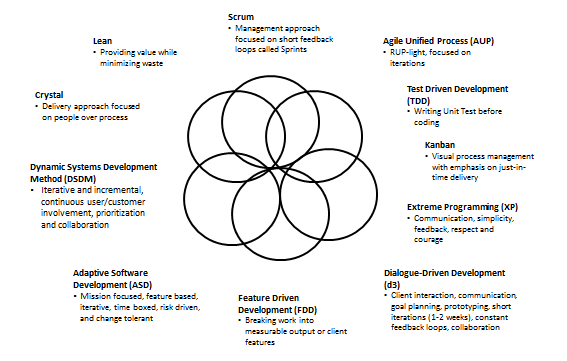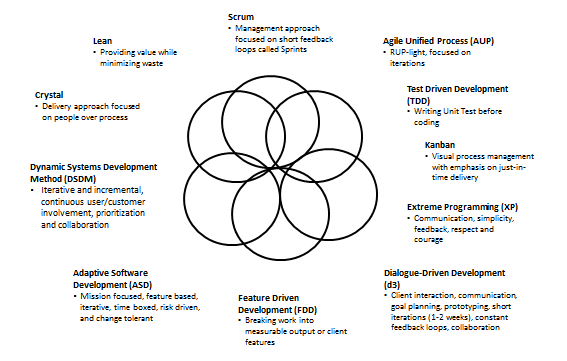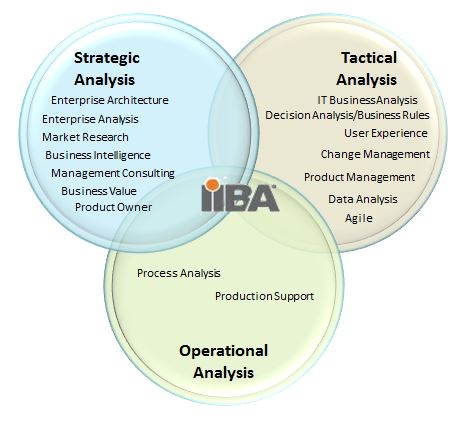
My Job Title is Not Business Analyst, But Am I One?
I recently had a friend who changed jobs, moving from a Business Analyst to Operations Analyst. I asked if she was going to our IIBA chapter meeting, she informed me that she had not planned on it since she wasn’t a Business Analyst anymore. In another conversation a friend was telling me that she knew a friend that was on the Board of Directors of their local IIBA chapter. When he moved to being a Data Analyst he felt that he no longer was a Business Analyst. It never ceases to amaze me how many people don’t feel that they are a Business Analyst because their job title is not Business Analyst, or some derivative thereof.
I am equally amazed when I get into conversations with people about agile; how they start talking about Scrum and it quickly becomes apparent that they believe that Scrum is the only agile methodology. I think Kent McDonald put it best:
“Scrum is to Agile
as
Kleenex is to facial tissue.”
Agile is an approach to software development based on iterative and incremental development to drive quicker delivery time of the solution. There are many methodologies that support the agile approach, Scrum being the most widely accepted, but not the only one. Other methodologies, such as Lean, Crystal, Kanban, Extreme Programming (XP), Agile Unified Process (AUP), Adaptive Software Development (ASD), and others support the agile principles. However, many are only aware of Scrum and believe it is the only agile methodology.

Just as the agile approach contains a few methodologies, Business Analysis contains a few business services to drive better business outcomes. Notice, I did not use the term ’business solutions’ as Business Analysis is more than about business solutions, it contains a few services outside of information technology projects that deliver business solutions. Business Analysis is about defining and delivering outcomes that is best for the organization; strategically, tactically and operationally.
STRATEGIC ANALYSIS
Strategic analysis is about developing a strategy for a business by examining the organization and the environment in which it operates and determining likely responses to events and changes going on around and within the organization. It’s called strategic because it’s high level and about a long-term direction for the organization. It’s called analysis because it is about breaking something that’s big and complex down into more manageable pieces. There are several business analysis roles within the organization that support strategic initiatives of the organization.
Strategic Analysis Areas
Strategic areas that business analysis plays a role include:
- Enterprise/Business Architecture – a well-defined practice for conducting enterprise analysis, design, planning, and implementation, using a holistic approach for the successful development and execution of the organizational strategy.
- Enterprise Analysis – the analysis to identify a business need, problem or opportunity, define the nature of a solution to that need, and justify the investment necessary to deliver that solution. Again as a holistic approach for the enterprise.
- Business Intelligence – the strategic arm of business analytics, or Prescriptive analytics, it is the use of data to prescribe the best course of action to increase chances of realizing the best outcome for the enterprise.
- Market Research – is about looking outside the organization at the market in which the organization operates to look for opportunities and threats from the environment and market(s) and make recommendations for strategic direction to take advantage of the opportunities and mitigate the threats.
- Management Consulting – is the practice of helping organizations improve performance through analysis of organizational problems and developing plans to mitigate those problems.
- Business Value Management – is a newer and lesser known concept of measuring the value of a business that expands beyond economic profit to include other forms of value such as employee value, customer value, suppler value, channel partner value, alliance partner value, managerial value and societal value.
- Product Ownership – is the holder of the Product Vision, the future vision of the firm’s product and the roadmap to achieve that future state. These products may be products that the organization sells in the marketplace or systems in use by the organization.
Strategic Analysis Job Titles
People working in strategic analysis for their company often have a job title such as Enterprise Architect, Business Architect, Enterprise Analyst, Enterprise Business Analyst, Project Portfolio Manager, Research Analyst, Market Analyst, Market Research Analyst, BI Analyst, Management Consultant, Business Value Manager and Product Owner.
Strategic Analysis Tasks
Popular tasks performed by Strategic Analysts include, but not limited to, Organizational Modeling, SWOT Analysis, Market Research, Capability Gap Analysis, Feasibility Studies, Decision Analysis, Business Rules Analysis, Surveys, Process Modeling, Prescriptive Data Analysis, Benchmarking, and Organizational Change Readiness Assessment.
TACTICAL ANALYSIS
Tactical Analysis is where the rubber hits the road; often this is the execution of the strategic analysis recommendations for the company. It includes IT project work, whether Waterfall or Agile methodology is used, Business Analytics, and Product and Change Management. There are several roles in the organization that perform tactical analysis.
Tactical Analysis Areas
Tactical areas that business analysis plays a role include:
- IT Business Analysis – this the widely accepted BA role working on IT projects to deliver business solutions to meet a specific business need, problem or opportunity.
- Agile Analysis – this role works on IT projects to deliver solutions for the business, but in an environment that uses one of the agile methodologies of software development. The analysis role often moves from one agile team member to another during the iteration in an agile environment.
- Business Analytics – is the scientific process of transforming data into insight for making better business decisions, this includes Descriptive and Predictive analytics.
- Decision Analysis/Business Rules – an approach to decision-making that examines and models the possible consequences of different decisions. Decision analysis assists in making an optimal decision under conditions of uncertainty.
- User Experience (UX) – involves a person’s behaviors, attitudes, and emotions about using a particular product, system or service.
- Product Management – is the process of managing the development of a product toward the realization of the product vision and roadmap.
- Change Management – is the process of analyzing the organization’s readiness for change and implementing that change.
Tactical Analysis Job Titles
This tactical analysis role is the one that most people think of when they speak of business analysis; more specifically those roles that work on IT projects and have titles like Business Analyst, Business Systems Analyst, Systems Analyst, Technical Analyst, Requirements Engineer, Solution Architect or IT Business Analyst. Other job titles in the tactical analysis area include Agile Analyst, Agile Team Member, Data Analyst, Decision Analyst, User Experience (UX) Specialist, Product Manager, Change Manager and Release Manager.
Tactical Analysis Tasks
Common tasks that these Tactical Analysts perform for their organizations include Observation, Interviews, Surveys/Questionnaires, Focus Group Discussion, Requirements Workshops, Document Analysis, Interface Analysis, Process Modeling, Data Modeling, Data Dictionary, Data Flow Diagraming, Brainstorming, Decision Analysis, Business Rules Analysis, Prototyping, Estimation, Risk Analysis, Structured Walkthrough, Vendor Assessment, Solution Scope Definition, Product Backlog Grooming, Use Cases, User Stories, Personas, Stakeholder Map, Organizational Change Readiness Assessment, Metrics and Key Performance Indicators, Acceptance and Evaluation Criteria Definition, and Lessons Learned.
OPERATIONAL ANALYSIS
Operational analysis is used to determine the efficiency of the business operations. This may include an examination of the company’s production methods, material costs, equipment utilization and workplace conditions.
Operational Analysis Areas
Operational areas in which business analysis plays a role include:
- Process Analysis – is the process of analyzing a business process or procedure, finding the waste in the process and determining how to improve it.
- Production Support – is providing end user support for IT systems/applications in use by the business.
Most people, even Business Analysts, will find it surprising that I list production support here. These analysts often perform root cause analysis and problem tracking until the issue is resolved. If these tasks are a major portion of your job, then consider yourself a business analyst. On the other hand, if you simply log the issue and pass it on to others to resolve, that is not business analysis.
Operational Analysis Job Titles
Common job titles in this area are Operations Analyst, Business Process Analyst, Process Analyst, Continuous Improvement Analyst, Production Support Analyst, Production Support Specialist, and Help Desk Analyst. As I said above, just because you have one of these job titles does not necessarily make you a business analyst. If you do not perform any of the tasks below, or perform them so rarely during your daily job performance, then you would not fall into a business analysis role despite having the word ‘Analyst’ in your job title.
Operational Analysis Tasks
Tasks that these Operational Analysts perform include Observation, Process Modeling, Document Analysis, Root Cause Analysis and Problem Tracking.
So just because your job title is not Business Analyst or Business Systems Analyst doesn’t mean that you are not a Business Analyst. There are many job titles that perform business analysis activities, and this is increased by those companies that get creative with their job titles. There are job titles in and outside of IT project work that performs business analysis activities. Remember, whether you are a business analyst is determined by the tasks you perform for the company, not by your job title. One way to put it is…
”IT Business Analyst is to Business Analysis
as
Scrum is to Agile”
I do have to add a word of caution here, just because you perform one or more of the business analysis tasks mentioned above rarely during the performance of your work doesn’t necessarily make you a business analyst. Many business analysts do perform other tasks outside of business analysis for their company, but a majority of their work is on business analysis tasks. These are considered hybrid business analysis roles and often are combined with tasks in project management, development and/or quality testing.
Perhaps we should define business analysis in Jeff Foxworthy fashion…”You might be a Business Analyst if…”
Don’t forget to leave your comments below.
Garage Door Installation near me
… [Trackback]
[…] Here you can find 52438 more Information on that Topic: batimes.com/articles/my-job-title-is-not-business-analyst-but-am-i-one/ […]